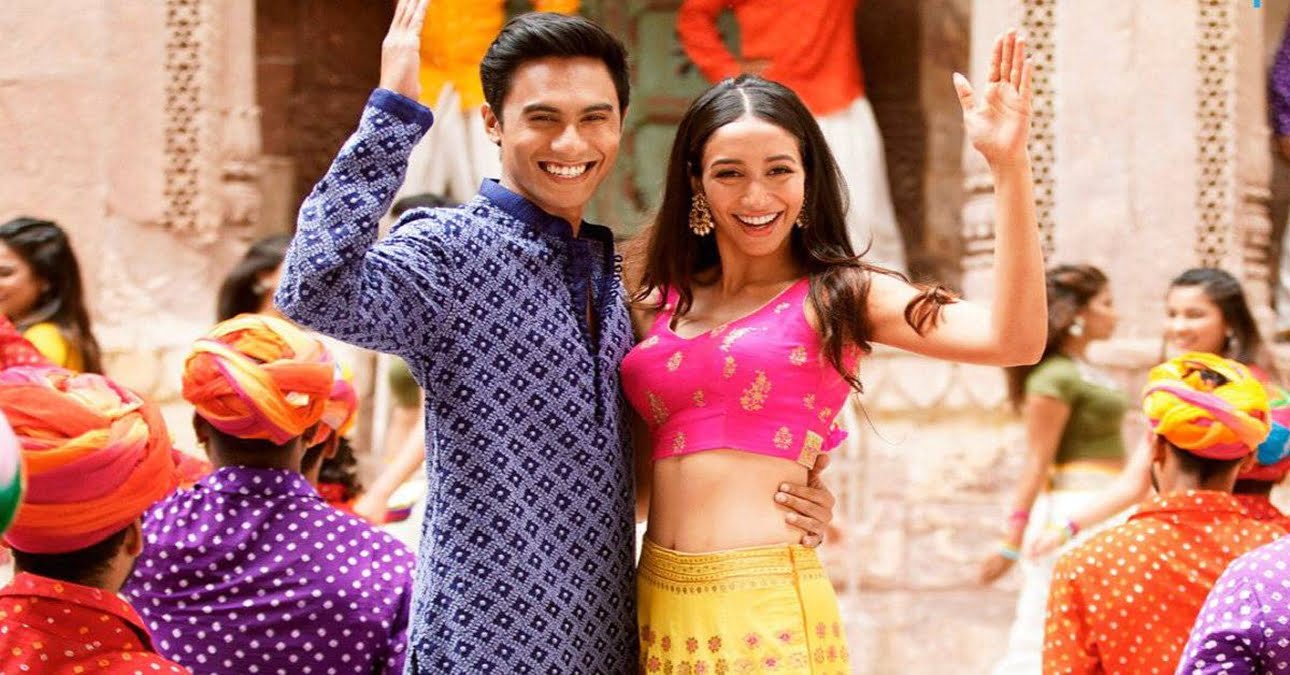Spoilers Ahead
Bandish Bandits hit the OTT platform Amazon Prime on August 4, 2020, but scored the majority of its audience by the slow mesmerising soundtracks by Shankar Ehsaan Loy. With an 8.7 IMDB rating, it is creating ripples among the Indian youth, a fairy tale of how two opposite worlds interact and fall in love. It has the perfect amount of masala for the Bollywood conditioned love-struck Indian youth who want to validate their broader understanding by appreciating the rusty classical music and the antique locations of Jodhpur. Though the series does justice to the locales, its representation of the gharana culture raises many questions that were always embedded under the musical veil of the Indian classical music scenario. Bandish Bandits is a depiction of confused masculinity faring through the patriarchal hierarchy and its relationship with the woman, the ‘other’.
Bandish Bandits is a depiction of confused masculinity faring through the patriarchal hierarchy and its relationship with the woman, the ‘other’.
Also read: Kabir Singh & The Ever-Elevating Rank Of Misogynistic Indian Archetype
The story in Bandish Bandits unfolds in the royal haveli of Jodhpur, the perfect setting to establish the plot of patriarchal hierarchy. Pandit ji, the head, the overlord of the ghar and gharana is a proud man, introduced in crisp white kurta pyjama seated on an elevated pedestal, depicting the embodiment of a masculine goddess Sarasvati himself. The goddess is the only woman he reveres, all other are mere plot points in his greater narrative of the ‘music’. The later episodes of Bandish Bandits unveil his shady past where even he, a man of such stature made mistakes. The ‘man’ married twice; left his first wife and son for a woman he fell in love with at the competition of Sangeet Samrat and later had two sons from her. Both his wives have no name, they are mere photographs. Both remain in anonymity until their patriarchal guardians, the son and grandson decide to bring them back to life, the former dedicating a music school on her name and the latter singing a thumri dedicated to her composed by Pandit ji.
Naseeruddin Shah plays the Pandit ji in Bandish Bandits, the lord of the house, the center around which the house and ambitions of the house members revolve but no one dares to question him. His eldest son, Digvijay (Atul Kulkarni) arrives to avenge the wrong his father had done by leaving his mother and taking away his only chance at love, but he is still portrayed revering his treacherous father. The other two sons spend their lives repenting and mourning their life’s worth but never muster enough courage to confront him. Rajendra (Rajesh Taliang), the elder son is threatened by money-lenders and is at the brink of a breakdown, but is neither respected by his father nor considered an heir. He even remarks towards the end that his wife is the only person who ever respected him, not even his son had bothered to ever look up to him with some respect.
Mohini (Sheeba Chaddha), the daughter-in-law of the house is shown humming from behind the kitchen window for most of the first episode in Bandish Bandits. Dressed in perfect lahariya sarees, she is the ideal Rajput wife and the perfect mother. She is never invited to sit at the dining table, and even when the king welcomes her, she hesitates. She is the one to take Pandit ji to his health check-ups and discipline her son when he stumbles, but it is made clear that she is only the passive audience. She speaks only when Pandit ji refuses to train Radhe (Ritwik Bhowmik) for the Sangeet Samrat, to save the gharana, the patriarch’s honor. Her character emerges to be the strongest, but the most cliched. She, the daughter of a poor man, married so her father could pay off his debts. She loved Digvijay but settled for Rajendra because Pandit ji had threatened to not pay for her father’s home. She was the only Sangeet Samratini of Jodhpur, the only woman who defeated Pandit ji at his craft. She was married to his son so she could be bound in the fetters of becoming an ideal wife and give up music for good. Her life behind the kitchen was Pandit ji’s revenge for a woman bruising the patriarch’s ego – she had to be taught a lesson! Her only solace after the man’s confession was a seat at the dining table.
In Bandish Bandits, Sheeba Chaddha is, as always, brilliant as Mohini who was married to Pandit ji’s son so she could be bound in the fetters of becoming an ideal wife and give up music for good. Her life behind the kitchen was Pandit ji’s revenge for a woman bruising the patriarch’s ego – she had to be taught a lesson!

Radhe, the protagonist of Bandish Bandits is a simple, raw, naïve small-town boy who falls in love with the pop music sensation Tamanna (Shreya Chaudhury). Theirs is a relationship of an exaggerated, stereotypical East-meets-West flavor. He commenting on the chhote chhote kapde and she looking at his naivety with the Bambi-like eyes filled with a purpose. In Bandish Bandits, Tamanna is the cliché hippie girl with blue streaks and a joint dangling from her lip, while he is the kurta-clad guy unknown of the ways of the world. She drinks and repairs cars, while he acts stupid and gushes at her attempts of role-play. But soon the dynamics of the relationship shift, as soon as Radhe is accepted by his grandfather as the heir apparent of his gharana. In a certain live session, Radhe sings all of Tamanna’s hook lines and boasts that he was trying to save her from the embarrassment of singing live. Such scenes are repetitive in Bandish Bandits where Radhe crosses his boundaries, and apologises later, even when he keeps her in the dark about his engagement. Tamanna invites Radhe to her life and makes him a part of it as soon as she decides to work with him, but she is only allowed in his world if she enters with Kabir, Radhe’s friend, and a guardian of their relationship. Radhe never introduces her to his family, while he frequently visits her home and gets physically intimate while her father is present in the same home.
Herein, Bandish Bandits showcases the contrast of ghar and bahar, which distinctly construct the usual ideals of what sort of a woman is not supposed to be introduced to the parents.
In Bandish Bandits, to give Radhe the color of an open-minded guy, he is introduced to Sandhya (Trida Choudhury), a ‘hot’ girl from the Royal family who has come from Belgium to marry an Indian guy. Kabir continues to make lewd comments about her body till he discovers an MMS video and tries to blackmail her to back out of the marriage. Here, Radhe shines through the scene as a soft-hearted man who could never reject a woman just because her sex tape has been posted online. Meanwhile, a woman who is a better and more qualified singer than Radhe is quick to be sidelined and never allowed a deeper layer to build her character. She comes, makes him the hero, and leaves. Another cliché character is Tamanna’s mother, Avantika (Meghna Malik). She is a career-oriented woman striving for perfection and pushes her daughter to be the best version of herself. She is the female other of Pandit ji, but because she is not a patriarch she has to be divorced and separated from her daughter’s life.
Bandish Bandits is a musical amalgamation of male egos, female stories of oppression, and a saga of confused masculinity. It not only demeans femininity but shows the cracks in a patriarchal hierarchy where even masculinity stifles. The Rajaji who has no queen to sit beside him is the head, Pandit ji is the king of his own haveli and music heritage and all others are below them. The swift decision to bring Radhe back home to under the leadership of Pandit ji is a beautiful depiction of how the patriarch’s ego is hurt at his grandson working who starts working as an accountant at the palace under a king. Mohini still finds her voice at the end, but Rajendra and Devendra are reduced to instrumentalists. Every performance of the competition is an ode to Pandit ji, a fight of beta-bhatija. Even when the host announces an applause for the guru, the mother who taught Radhe that every ion of this universe has music and rhythm, even sweeping and cloth-washing, is pushed to the margins and away from focus.
Also read: The Covert Misogyny In Sooraj Barjatya’s Films
Radhe’s life is a continuous struggle to please the lord of the house, he suffers every wrong only so that Pandit ji could validate his existence. He begs and wears a literal mask to keep his grandfather in the dark about the reality of their financial situation. Rajendra gets insulted by the bank manager and Devendra sells his patented instrument only so they could save Pandit ji’s haveli. It is a precise commentary of how patriarchy is toxic not only for women who stifle under the oppression but also for the men who design their lives as a project for validation. The careful depiction of hierarchy of patriarchy covered by the musical notes of Indian classical music.
Featured Image Source: Elfaworld.com
About the author(s)
Guni Vats is a research scholar at University of Lucknow. A passionate researcher and a curious soul, she aims to shift the 'center', one-word-at-a-time.







When is patriarchy gonna end ? We must demolish the patriarchal system and feminism is the only way to equality. If you believe in equality than you are a feminist. End patriarchy it is causing more harm to men. I think matriarchy should be the future bc it’s more egalitarian and gives chances to everyone.
Please change the title to “Bandish Bandits from a frmals chauvinist’s point of view”